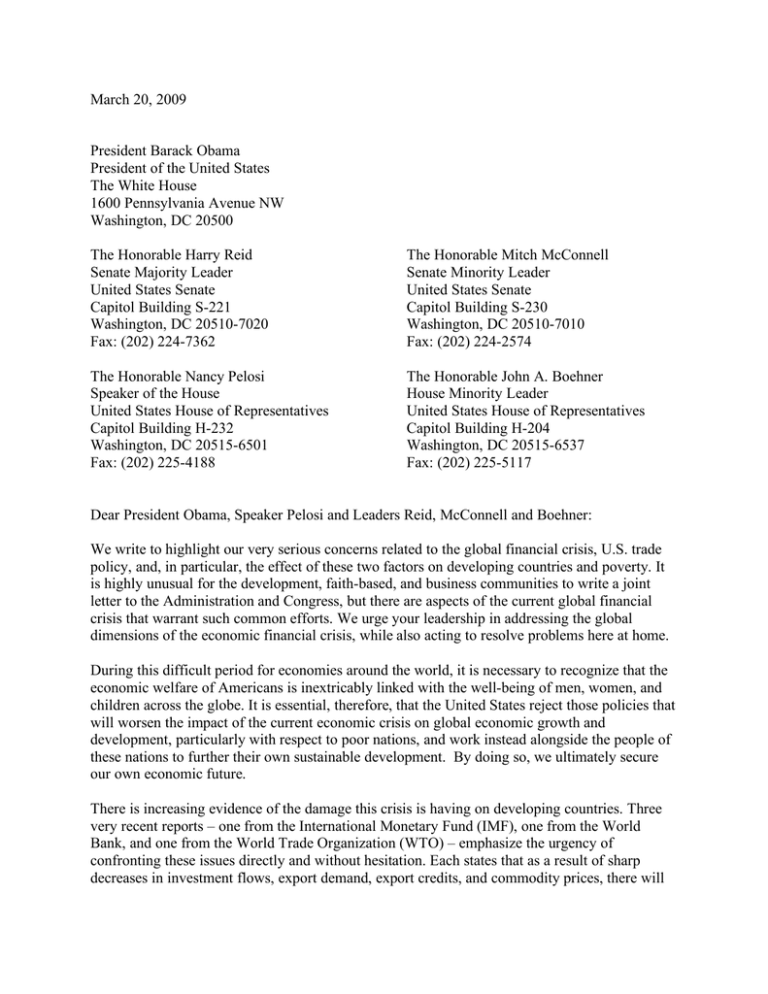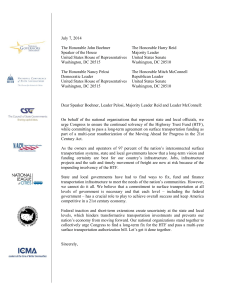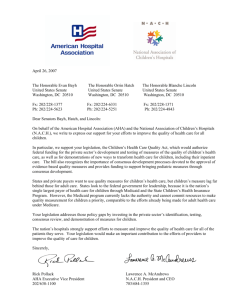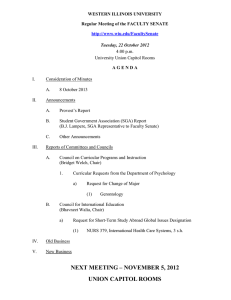March 20, 2009 President Barack Obama President of the United States
advertisement

March 20, 2009 President Barack Obama President of the United States The White House 1600 Pennsylvania Avenue NW Washington, DC 20500 The Honorable Harry Reid Senate Majority Leader United States Senate Capitol Building S-221 Washington, DC 20510-7020 Fax: (202) 224-7362 The Honorable Mitch McConnell Senate Minority Leader United States Senate Capitol Building S-230 Washington, DC 20510-7010 Fax: (202) 224-2574 The Honorable Nancy Pelosi Speaker of the House United States House of Representatives Capitol Building H-232 Washington, DC 20515-6501 Fax: (202) 225-4188 The Honorable John A. Boehner House Minority Leader United States House of Representatives Capitol Building H-204 Washington, DC 20515-6537 Fax: (202) 225-5117 Dear President Obama, Speaker Pelosi and Leaders Reid, McConnell and Boehner: We write to highlight our very serious concerns related to the global financial crisis, U.S. trade policy, and, in particular, the effect of these two factors on developing countries and poverty. It is highly unusual for the development, faith-based, and business communities to write a joint letter to the Administration and Congress, but there are aspects of the current global financial crisis that warrant such common efforts. We urge your leadership in addressing the global dimensions of the economic financial crisis, while also acting to resolve problems here at home. During this difficult period for economies around the world, it is necessary to recognize that the economic welfare of Americans is inextricably linked with the well-being of men, women, and children across the globe. It is essential, therefore, that the United States reject those policies that will worsen the impact of the current economic crisis on global economic growth and development, particularly with respect to poor nations, and work instead alongside the people of these nations to further their own sustainable development. By doing so, we ultimately secure our own economic future. There is increasing evidence of the damage this crisis is having on developing countries. Three very recent reports – one from the International Monetary Fund (IMF), one from the World Bank, and one from the World Trade Organization (WTO) – emphasize the urgency of confronting these issues directly and without hesitation. Each states that as a result of sharp decreases in investment flows, export demand, export credits, and commodity prices, there will be a substantial reduction in export opportunities for developing countries. Africa is particularly at risk because of its high poverty levels, fiscal instability, and reliance on commodity exports. Within these countries, the most vulnerable populations will be the hardest hit. Already, the crisis has pushed millions of additional people into poverty. The World Bank reports that each one percent drop in global economic growth could trap another 20 million people in poverty. Given that the worst of the crisis has yet to come, the threat to the developing world is severe and growing. These trends represent a tangible and serious threat to improvements that have been made in the post-war period to the lives of millions of poor and vulnerable people around the world. Of particular concern are measures that seek to close off our economy from the rest of the world, steps that would likely harm those least capable of managing these turbulent economic times. History can teach us important lessons. In previous times of economic crisis, there is a tendency to seek to protect one’s own economy in ways that give preference to domestic markets and domestic industry. Steps in this direction risk contravening existing U.S. commitments to our trading partners and may, indeed, provoke similar behavior by other countries, leading to a downward spiral toward uncertainty and instability. In this regard, U.S. trade and development policies that promote global economic growth, encourage poverty alleviation, increase political stability, and promote openness are not only in our economic self-interest, they are in our national interest. Indeed, such policies, which reinforce the Administration’s commitment to assume the mantle of leadership in a multilateral economic system, are essential to help our nation achieve our broader economic, foreign policy, and national security goals. To this end, we urge the Administration and Congress to: • Affirm U.S. support and work vigorously for a successful conclusion of the WTO Doha Development Agenda that will open major markets for both developed and developing countries and will fulfill the original development objectives of the round to spur muchneeded economic development and opportunity in the world’s poorest countries. • Call for the reaffirmation at the London Summit in April of the commitment that the United States and the rest of the G-20 made in Washington last fall that underscores the critical importance of rejecting destructive protectionism and not turning inward in times of financial uncertainty. • Review and reform U.S. trade-preference programs to ensure that they are effective and broad in coverage, include strong capacity-building programs, and give special attention to least-developed and uniquely vulnerable countries, such as those in sub-Saharan Africa. One key step would be the creation of a single trade- preference program with common eligibility rules and expanded access for the poorest and most vulnerable. • Reinforce the commitment to increase development assistance, with a specific emphasis on: 1) elevating global development as part of our national strategy; 2) establishing policy coherence between diverse U.S. government departments and agencies on trade, foreign, and development policy, including an effective coordination of economic funding that is required to achieve critical development goals; and; 3) addressing issues at the intersection of trade and investment related to climate change. It is important to remember that at the heart of the global financial system are working families and local communities whose fate is bound together in a globalized economy. Our nation is undergoing severe distress in terms of jobs, businesses and investment that is taking a daily toll on people. Such problems should motivate us to seek solutions that reject destructive protectionism on the one hand and global indifference to the plight of the poor on the other. We urge you to act now in an assertive and purposeful manner, both to resolve the critical problems we currently face and in anticipation of the critical problems that are to come. Respectfully, David Beckmann, President, Bread for the World Nancy Birdsall, President, Center for Global Development John Castellani, President, Business Roundtable Calman J. Cohen, President, Emergency Committee for American Trade Edward Gresser, Director, Trade & Global Markets, Progressive Policy Institute The Episcopal Church The Evangelical Lutheran Church in America Most Rev. Howard J. Hubbard, Bishop of Albany, United States Conference of Catholic Bishops Jim Kolbe, Senior Transatlantic Fellow, German Marshall Fund of the United States Katrin A. Kuhlmann, President, Trade, Aid and Security Coalition David Lane, CEO, ONE Raymond C. Offenheiser, President, Oxfam America Jennifer Potter, President & CEO, Initiative for Global Development Peter M. Robinson, President, United States Council for International Business William A. Reinsch, President, National Foreign Trade Council Ritu Sharma, President, Women Thrive Worldwide Richard Stearns, President, World Vision


